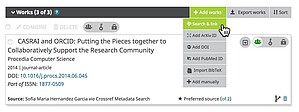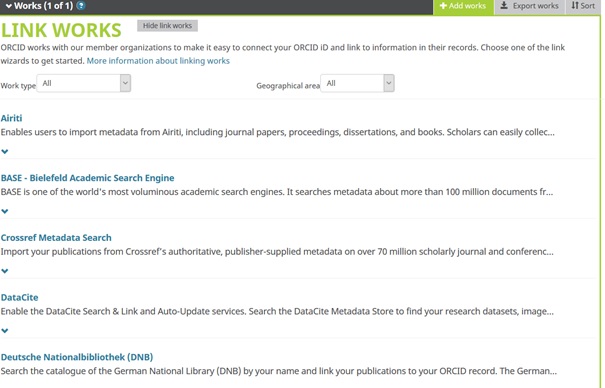ORCID
What is ORCID?
ORCID (Open Researcher and Contributor Identifier) is an internationally recognized personal identifier for researchers and links authors to their journal articles, research data, etc. It is unique and can be used permanently, independent of publishers and institutions. Researchers manage their ORCID profile themselves and therefore determine the visibility of their data.
An ORCID iD consists of 16 digits displayed in groups of four. It is usually specified as a URL. Example: https://orcid.org/0000-0003-3156-7889
The International ORCID Consortium is a publisher-independent non-profit organization established by and for the research community. ORCID already clearly links 10 million researchers with their research results.
Since the end of 2020, the University of Hohenheim has been a member of the ORCID Germany Consortium. Register with ORCID and link your name to your research results to take advantage of the benefits.
Further questions about ORCID
Independent of institutions or publishers, ORCID links your name to your research output and thereby improves the visibility of your research. This will save you time and work.
- ORCID is an internationally established standard
- ORCID is free of charge
- You are clearly identifiable, despite name variants, name changes, or abbreviations. Even common names - such as Martin Müller - can be clearly identified with it.
- You can keep your complete publication list in a central location that is independent of any employer. You can use your ORCID ID and your profile stored there for life.
- You can link your ORCID ID to your articles, monographs, research data, patents, software, and much more.
- When communicating with publishers, you only need to specify your ORCID ID. If you have granted the publisher the rights to do so, they will have access to all the information they need via your ORCID profile.
- You can use your ORCID ID to grant access to your profile when submitting applications and reports for research funders and third-party funders.
In your privacy settings, you define what information is displayed publicly as well as what can be shared with trusted partners and who these partners are.
- You have control over your profile. Only your name and your ORCID ID are always publicly visible. For all other profile details, you can set the visibility yourself individually.
- You determine which rights you grant to selected publishers and databases, so-called “trusted parties" or "organizations" (e.g. Crossref, DataCite, Scopus, etc.).
- You can review, change, and revoke granted rights in your ORCID profile via "account settings" at any time.
- Information on the topic of data protection at ORCID can be found in an expert opinion on data protection law from 2017, which was commissioned by the DFG.
1. Register
- Only set up one ORCID ID. If you are not sure if you already have one, you can search for your name at ORCID.
- If you already have multiple ORCID iDs, here are instructions on how to merge them.
- Record all spellings and variations of your name in your profile, including your birth name if applicable.
- The more information you provide, the more meaningful your profile will be.
- We recommend the following entries for employment:
- Organization: Search for"hohenheim”
- Select entry "Universität Hohenheim, Stuttgart, Baden-Württemberg“ or “University of Hohenheim”
- Display state/region: "Baden Württemberg"
- Department: "Faculty N.N., Institute or Department N.N."
- A step-by-step guide "How do I create an ORCID?" or direct entry to https://orcid.de/register
2. Add publications to ORCID profile and enable data synchronization
After creating an ORCID ID, you will find several options under "Works" -> + "Add Works" for adding the metadata of your publications to your profile and keeping your publication list up-to-date. ORCID is not optimized for maintaining a publication list. Therefore, we recommend automatic data import from various data sources.
- "Search & link" In your ORCID profile, use ORCID members' link wizards to add your publications. To do this, click on "Works" -> + "Add Works" ->"Search & link".

Once you have selected "Search & link," a selection list will open.

Select the services relevant to you one by one and give them the required permissions to read your profile and add data ("Authorize access”). Then a list of all publications matching the information in your profile will appear. Select the applicable publication and import it by clicking on "Add to ORCID record”.
To get started, we recommend selecting the following providers if your publications are referenced in these databases or by these services:
- Crossref Metadata Search - assigns DOIs for text publications. If your publication data already contains a DOI, it will automatically be added to your ORCID profile.
- DataCite - assigns DOIs for research data, images, and other non-textual publications. If your publication data already contains a DOI, it will automatically be added to your ORCID profile.
- German National Library (DNB) – finds books, dissertations, etc. registered with the DNB. The author identifier of the GND (Gemeinsame Normdatei) used there is displayed in the ORCID profile under "Other IDs".
- Scopus – Elsevier - the "Author ID" from Scopus is also displayed in the ORCID profile under "Other IDs" after the permissions have been approved.
A video on how to use "Search & link" can be found here.
Import via BibTeX:
Publication data that you do not obtain via the above imports can also be imported from your own reference management programs such as Citavi and Zotero or Google Scholar in BibTeX format.

Manual:
You can enter bibliographic metadata yourself via "+ Add manually" if a publication cannot be found in the previously mentioned sources.
If your publications are listed in the Scopus database, you should link your ORCID profile to your Scopus Author ID.
- Log in to the ORCID record+
- Then click on "Works" -> "+Add works" -> "Search &link"
- Select "Scopus".
- Authorize Scopus (“Authorize access“) to read the information in its own ORCID record and write meta-data to the "Works" and "Other IDs" sections.
- In Scopus, select the works you want to add and confirm your selection.
- Finally, check the transferred metadata in the ORCID profile.
With this function you can link your ORCID record with publications in the catalogue of the German National Library (DNB).
- Log in to your ORCID record.
- Then click on "Works" -> "+Add works" -> Click "Search & Link".
- Select “Deutsche Nationalbibliothek (DNB, German National Library)."
- Authorize DNB to read the information in its own ORCID record and write meta-data to the "Works" and "Other IDs" sections.
- Search for your own publications.
- Select your own name under each publication; if your name is not listed, the link to the catalogue should be followed by selecting the title to check whether it is the publication you are looking for. If necessary "I am not listed, but contributed to this publication" can be selected.
- Confirm the selection.
- Finally, check the transferred metadata in your ORCID profile.
You should also mention your ORCID ID in all your scientific activities, especially
- in your publications
- when contacting publishers (they report your ORCID ID to CrossRef, for example)
- in contact with research funding organizations
- at conferenceson your presentation slides
- on your website
- in your email signature
- on your business card
CrossRef
CrossRef is a publisher network and registration organization for DOIs (identifiers) of text publications. If DOIs are linked to your ORCID ID in the CrossRef database, the corresponding publications will automatically be added to your ORCID profile if you have selected CrossRef as a trusted party.
DataCite
DataCite is a registration organization for DOIs (identifiers) for research data and other non-text publications. If DOIs are linked to your ORCID ID in the DataCite database, the corresponding publications will automatically be added to your ORCID profile if you have selected DataCite as a trusted party.
DOI (Digital Object Identifier)
The Digital Object Identifier, or DOI, is a persistent identifier used to cite and link electronic resources (texts, research data, or other content). Structured metadata is assigned to the document via the DOI name. The DOI name consists of a unique alphanumeric character string. It always starts with 10 and has the form 10.ORGANISATION/ID, e.g. 10.1000/182 The corresponding document can be found on the Internet either by entering the DOI in the search mask of a DOI resolver or by entering it as Scopus
Scopus Author ID
The Scopus Author ID is an identifier for authors in the Scopus database. In contrast to the ORCID ID, it is linked to the Scopus database and therefore not valid across institutions and products.
Do you have questions or comments about this site? contact form
